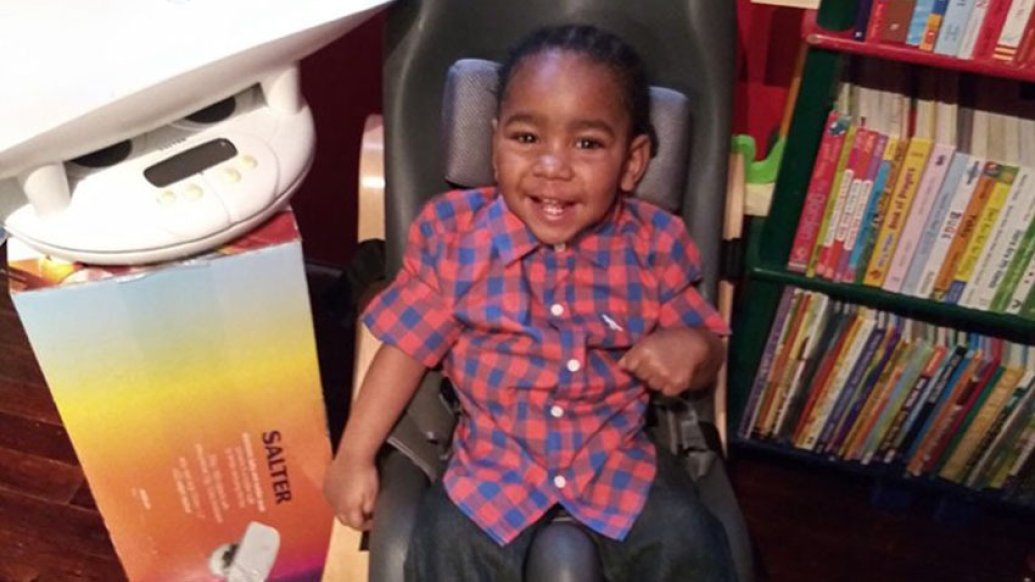How a simple health care need gained importance during the pandemic.
1:23 PM
Author |

Emily Bair, a pediatric specialty dietitian, works in the outpatient gastroenterology/craniofacial anomalies and surgery clinic at Michigan Medicine's C.S. Mott Children's Hospital. Her team works with patients from infants to teens to manage their growth and weight due to various health care challenges.
Prior to COVID-19, parents typically brought their kids to the clinic once or twice a week to check their weight and adjust nutritional plans.
"Small changes in nutrition can affect how well babies thrive," says Bair. "So regular weight checks are crucial for this population of patients."
For Yolanda Cleveland, the pandemic added to growing concerns about caring for her young son, Re'mon.
In January 2020, Re'mon was admitted to Mott for failure to thrive. At 13 months old, he was only 14 pounds and was constantly vomiting. He was diagnosed with a rare genetic condition that created low muscle tone in his body, including his esophagus. This condition made it difficult for him to eat and digest food, and his brain development was also lagging with the lack of nutrition.
With the rigorous support from his care team, Re'mon was stabilized with a feeding tube and discharged for follow up at home.
But then the pandemic hit, and clinics shut down. Cleveland, and parents like her, were left without many options.
A previously simple health care need became nearly impossible.
Weighing their options
Cleveland wanted to care for her son at home and knew that monitoring his nutrition and weight was crucial to keeping him out of the hospital again.
Bair, meanwhile, was concerned about how to continue supporting parents and children while not putting upon them the undue financial pressure of purchasing scales. The recommended scales needed for these infant weight checks cost anywhere from $60 – $300.
So Bair and a team of dietitians brainstormed ways to obtain scales and decided to pursue outside funding from donor resources. Most of the donated funds that came in during COVID-19 were focused on obtaining personal protective equipment for health care workers and patients.
MORE FROM THE LAB: Subscribe to our weekly newsletter
After some research, though, Bair landed on a local community nonprofit, called Canton Community Foundation, that found a donor for the clinic. Bair then coordinated with the Guest Assistance Program to utilize the funds provided by a private donor.
With the initial $1,000 donation, the team was able to purchase ten scales for families in need.
"The scale was a life changing difference for us," explains Cleveland, "When we first brought Re'mon home from the hospital in January, we were told to consider hospice as his doctors were not sure they could get him stabilized. But I didn't want to give up."
Finding growth
Over the last few months, Bair has worked closely with Cleveland and her son to change his nutrition from baby formula to purees. His weight had to be monitored closely to ensure that his body was accepting the changes.
And Cleveland knows these changes are helping her son grow and thrive. He is now 25 pounds and his brain development has normalized.
Since the beginning of the pandemic, the team has purchased 30 additional scales to support families and children who qualify.
By thinking beyond the restrictions brought on by the pandemic, Bair and her team exemplified the meaning of caring.
This simple act has had a deep impact in the life and health of Re'mon Cleveland and his mother Yolanda.
"Just because we weren't seeing patients in person didn't mean we couldn't help them," Bair explains. "I'm grateful for the support from the community and our colleagues so we can continue to care for our patients."
Like Podcasts? Add the Michigan Medicine News Break on iTunes, Google Podcast or anywhere you listen to podcasts.

Explore a variety of healthcare news & stories by visiting the Health Lab home page for more articles.

Department of Communication at Michigan Medicine
Want top health & research news weekly? Sign up for Health Lab’s newsletters today!





